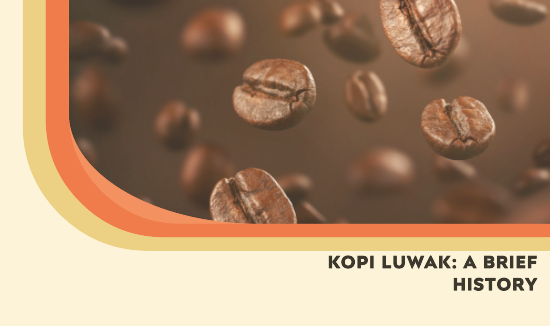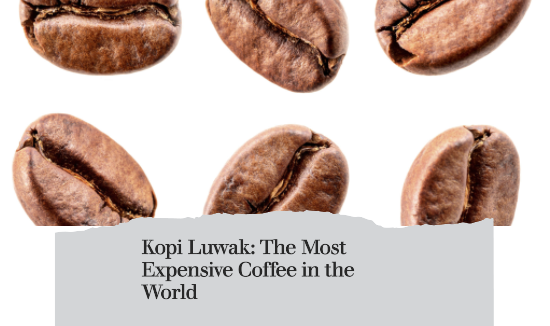
A unique coffee variety has intrigued coffee drinkers and critics. It’s called “coffee made from poop,” but don’t let the name scare you off. This is the story of Kopi Luwak, a strange, complicated, and controversial coffee drink that has made a place for itself in the world of coffee.
Also known as civet coffee, Kopi Luwak is distinguished by its unusual production process, which involves the Asian palm civet, a small mammal native to Southeast Asia. The civet plays an integral role in the creation of this unique coffee by consuming ripe coffee cherries and excreting the beans, which are then collected, cleaned, and processed to produce Kopi Luwak.

History of Kopi Luwak – A Rich Legacy of Coffee Made From Poop
The roots of Kopi Luwak, or coffee made from poop, are firmly planted in the rich soils of Indonesian coffee plantations. Dutch colonialists set up coffee farms in Indonesia and brought beans from Yemen to make this one-of-a-kind coffee. In the 1800s, farmers in central Java found that the Asian palm civet, which is known for being picky about what it eats, was eating ripe coffee cherries from their farms and pooping out beans. Because people were interested, these beans were collected, cleaned, and used to make Kopi Luwak.
The name Kopi Luwak itself is Indonesian. “Kopi” means coffee, and “Luwak” is the local term for the Asian palm civet. Over time, the demand for this unique coffee grew, and it went from being a local curiosity to a famous type of coffee that coffee lovers from all over the world enjoy. Even though the way Kopi Luwak is made is controversial, it has survived and even grown thanks to its unique taste and the interesting story behind it.
Ethical Concerns
There are ethical concerns related to the production of kopi luwak, as the increasing demand for this unique coffee has led to the exploitation of civets. Many are captured and kept in poor conditions, being force-fed coffee cherries in order to increase production. This has led to concerns about animal welfare, as these farming practices often result in high mortality rates among civets.
The Digestive Process and Its Effects on Coffee
The digestive process of the civet plays a significant role in creating the unique characteristics of kopi luwak. Digestive enzymes and gastric juices penetrate the coffee cherries during digestion, breaking down proteins and altering the composition of the beans. This process, along with the civet’s selection of the ripest and most flawless cherries, is believed to contribute to the coffee’s unique flavor.
Animal Poop Coffee
Animal poop coffee is any kind of coffee that is made in a similar way to kopi luwak, where the coffee cherries are fermented in the digestive systems of different animals. The process is pretty much the same: animals eat the cherries, which ferment in their stomachs and are then passed out. The beans are then gathered and used to make coffee. Even though kopi luwak is the most well-known type of coffee made from animal poop, there are other types made from the waste of other animals.

Why is Kopi Luwak One of the Most Expensive Coffees in the World?
Kopi Luwak is known as one of the most expensive coffees in the world, and there are several reasons behind this high price tag. The first reason is the unique process by which it is produced. Unlike regular coffee, where cherries are simply harvested and processed, Kopi Luwak involves a complex procedure of digestion and excretion by the Asian palm civet.
The civets eat the coffee cherries, and as they move through their stomachs, the beans ferment, which is thought to make them taste better. This special way of making coffee, called “civet coffee,” is what makes Kopi Luwak different from other types of coffee and a big part of why it costs so much.
The second thing to consider is how rare the product is. It takes a lot of work to get these beans because you have to collect civet droppings, sort out the beans, and clean them before they can be used. The civets are picky about what they eat and usually only eat the ripest cherries. This means that not every cherry eaten by a civet turns into a coffee bean that can be used. Because the civets are picky eaters and don’t eat a lot, the output of Kopi Luwak beans is quite low. This makes it a rare and highly sought-after product.

Health Benefits and Drawbacks of Consuming Kopi Luwak
Kopi Luwak has health benefits, but it’s important to remember that it’s still coffee at its core, even if it’s made in a different way. So, it has many of the same health benefits as regular coffee, but it also has some special qualities due to the way it is made.
One of the main health benefits of coffee, including Kopi Luwak, is its high antioxidant content. Antioxidants are compounds that help protect the body against damage from harmful molecules called free radicals. Regular consumption of antioxidant-rich foods and beverages, like coffee, can help reduce the risk of chronic diseases like heart disease and cancer.
Furthermore, the process by which Kopi Luwak is produced can lead to some unique health benefits. The fermentation process that the coffee beans undergo in the digestive system of the civet is believed to lower the overall caffeine content and make the coffee easier to digest. This could be beneficial for individuals who enjoy coffee but are sensitive to caffeine or have digestive issues. Some also claim that Kopi Luwak is less acidic than other types of coffee, which could make it a better option for those with acid reflux or other similar conditions.
However, there are also potential drawbacks to consider when consuming Kopi Luwak. Due to its high price and rarity, it may not be a practical choice for daily consumption. More importantly, there are ethical concerns associated with its production, particularly in cases where civets are mistreated or kept in poor conditions. These ethical issues don’t have a direct impact on the health of the consumer, but they are an important factor to consider when choosing to consume Kopi Luwak.
Also, since the coffee beans come from the waste of wild animals, they could be contaminated if they aren’t cleaned and handled properly. Even though reputable producers take steps to make sure their product is safe and clean, there is always a risk when working with products like these.
Conclusion
Kopi Luwak has a special place in the world of premium coffee. People often refer to it as “coffee made from poop,” but its background, making process, and taste make it stand out from other types. However, it’s crucial to consider the ethical issues surrounding the production of Kopi Luwak. The intensive farming method often used raises concerns about the treatment of civets. It’s advisable to choose products from producers that prioritize ethical and sustainable methods.
The health effects of Kopi Luwak are similar to those of regular coffee. However, the way it is processed makes it less caffeinated and may make it easier to digest. Even though it’s expensive and raises social questions, Kopi Luwak may be the perfect coffee for people who want to try something different.
FAQs
What is Kopi Luwak?
Kopi Luwak, also known as civet coffee, is coffee that consists of partially digested coffee cherries. These cherries have been eaten and then defecated by the Asian palm civet. The beans are then collected from the feces, cleaned, and processed to make coffee.
Why is Kopi Luwak so expensive?
Kopi Luwak is one of the most expensive coffees in the world because of how it is made, the amount of it there has been existing, and how much coffee lovers want it. Only a small amount of Kopi Luwak is made each year because it takes a lot of work to collect the coffee beans.
Is Kopi Luwak safe to drink?
Yes, Kopi Luwak is safe to drink as long as it is processed and cleaned properly. The heat from roasting the coffee beans would kill any potentially harmful microorganisms. However, it’s important to buy from reputable sources to ensure the safety and quality of the coffee.
What are the health benefits of Kopi Luwak?
Kopi Luwak has similar health benefits to regular coffee, such as being rich in antioxidants. It’s believed that coffee is easier to digest and has a lower caffeine content due to the fermentation process in the civet’s digestive tract.
What does Kopi Luwak taste like?
Kopi Luwak is often described as having a smooth, rich, and less bitter taste compared to other coffee varieties. The specific flavor can vary based on factors like the type of coffee cherry the civet consumed, the roast of the beans, and the method of preparation.

As a dedicated blogger, I share insights, tips, and knowledge on all things caffeinated and beyond. I firmly believe that a well-brewed cup of coffee or a skillfully crafted cocktail has the power to unite people and ignite engaging conversations.



